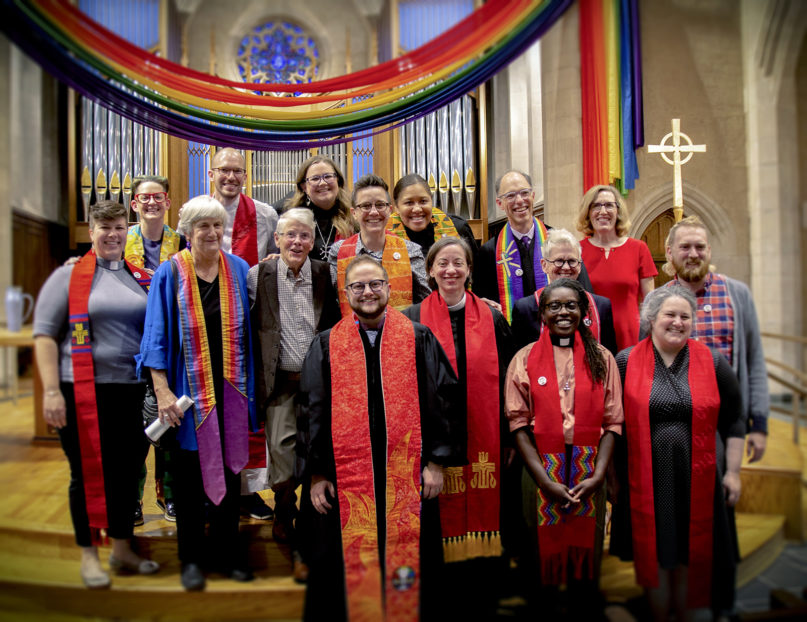(RNS) — When Austen Hartke arrived at Luther Seminary in St. Paul, Minnesota, he knew it was the only Lutheran seminary that didn’t participate in his denomination’s LGBTQ+ welcoming program. But as his awareness grew that he was transgender, so did his conviction that Luther was the right place for him.
Hartke, who had come out as bisexual years before applying to seminary, had specifically picked the school, he said in a recent interview, so he would learn to navigate his identity and ministry while being exposed to “the Midwestern attitudes I lived with every day.”
Still, said Hartke, who today runs the Transmission Ministry Collective, a community that supports transgender and other nonbinary Christians, “I didn’t come out as trans until I was holding my diploma, because I didn’t know what would happen.”
Hartke is one of a growing number of openly transgender students graduating from mainline and non-denominational Christian seminaries, many of which have made strides over the past decade toward welcoming them to explore their spirituality. But even as the mainline denominations have largely come to welcome LGBTQ individuals, transgender seminarians are still encountering hurdles to ordination and being called to a church, challenging liberal church attitudes about acceptance and often finding new paths for service.
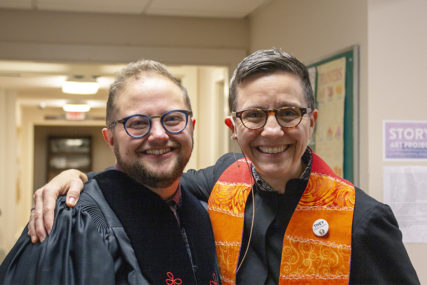
The Rev. Alex Patchin McNeill, left, and Rev. Jess Cook at McNeill’s ordination at First Presbyterian Church in Asheville, North Carolina, on Oct. 11, 2019. Photo by Liz Williams
“Queer and trans folks are really helping to lead this next stage of the reformation,” said the Rev. Alex McNeill, executive director of More Light Presbyterians, an LGBTQ education and advocacy group, “reforming what ministry can be and what worship can look like.”
Mainline U.S. denominations, such as the Evangelical Lutheran Church in America, the Presbyterian Church (USA) and the Episcopal Church, began striking down prohibitions against the ordination of LGBTQ candidates more than a decade ago, but, as in other sectors, the acceptance of transgender people has lagged behind that of gay and lesbian clergy.
“We have a church still grappling with how limiting the binary is,” said McNeill. “It wasn’t until 2018 that we had the first overture passed by the General Assembly that specifically named trans and non-binary folks as beloved by God, as worth advocating for in the public square.” In 2019, McNeill and the Rev. Jess Cook, who also works for More Light Presbyterians, were the first two openly transgender ministers ordained in the Presbyterian Church (USA).
In the Evangelical Lutheran Church of America, transgender identities weren’t discussed in the denomination’s 2009 statement on sexuality that affirmed lesbian and gay priests, noted Amanda Gerken-Nelson, executive director of Extraordinary Lutheran Ministries, a pro-LGBTQ group. No explicit affirmation followed, even after the ELCA ordained an openly transgender person, Asher O’Callaghan, in 2015.
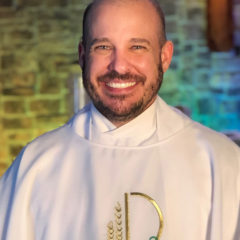
Jakob Hero-Shaw. Photo by Allan Hero-Shaw
“People are solid on gay and lesbian issues but not on trans,” said the Rev. Jakob Hero-Shaw, senior pastor of Metropolitan Community Church of Tampa, Florida.
Beyond official declarations are barriers that technically disqualify transgender candidates. The ELCA, PCUSA and Episcopal Church all require anyone seeking ordination to undergo a psychiatric evaluation. Sometimes these evaluations describe being transgender as a form of sexual deviancy.
Facing a psychiatric evaluation shortly after arriving at Vanderbilt, Adrian White, a Presbyterian and a student at Vanderbilt Divinity School in Nashville, Tennessee, decided it would be simpler not to identify as transgender to the evaluator. “I let him assume whatever he needed to for me to get through it,” said White. “I didn’t misidentify myself, but he used the wrong pronouns in the report and I let my (Commission on Preparation for Ministry) team know he used the wrong pronouns and to ignore them.
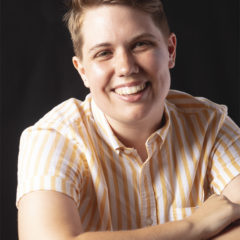
Adrian White. Photo by Sadie Edwards
“There’s this disconnect between what it means to be affirming and inclusive on paper versus what it means to actually recognize and embrace the full humanity and gifts of trans people on a practical, real-life relational level,” said White.
Clinical Pastoral Education, another typical requirement for seminarians for ordination, commonly involves a field placement as a hospital chaplain. Hospitals, however, have strict dress codes or simply prefer those who fit traditional gender expectations and are often quick to dismiss transgender applicants.
Those who make it through to ordination still face the most daunting barrier: finding a pulpit. “Every job I’ve had in the church, from my field placements to the job I have now, has had an extra interview to talk about gender,” said one seminary graduate who preferred to remain anonymous. “Usually it’s a series of invasive and probably illegal discriminatory questions about my gender and my life and how is this going to affect my ministry.”
“What we’re finding is LGBTQIA folks are being assigned back to their home synod,” or regional body, said Gerken-Nelson, using the acronym for Lesbian, Gay, Bisexual, Transgender, Queer, Intersex, Asexual, “because no synod felt like any of those open calls would take an LGBTQIA person.”
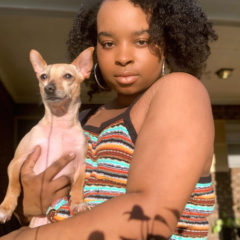
Desi Hall attends Vanderbilt University. Courtesy photo
Desi Hall, a Black transgender woman from Alabama who attends Vanderbilt’s divinity school, explained that discrimination against transgender clergy is compounded by race. As a result, minority transgender seminary graduates are forging their own way in ministry outside the traditional church environment.
“A lot of us are not looking to be accepted into these cis het church spaces, because we know that’s not life-giving for our community,” she said. “Many people I’m in community with are trying to figure out how to recreate new sacred spaces and how do we fund sacred spaces.” While still in school Hall co-founded the Frances Thompson Education Foundation, which raises funds for college scholarships to Black trans and non-binary students. On graduation she plans to continue as co-executive director full time.
“The way we’ve done church for some time now has been a way to avoid life and the world,” said Cook, of More Light Presbyterians, of their fellow transgender Christians. “People are tired of that and want something more.”
The expectations for change are being raised at the seminaries themselves. Welcoming programs are not restricted to the traditionally liberal, coastal schools, such as Union Theological Seminary in New York and Pacific School of Religion in California — which Hero-Shaw, a 2009 graduate, called “the most welcoming and accepting place I had ever experienced.”
Lyndsey Godwin is assistant director for the Carpenter Program on Religion, Gender and Sexuality at Vanderbilt, which leads trainings in creating trans-affirming spaces. In the early 2000s it partnered with the Human Rights Campaign to fund scholar-activists for LGBTQ issues.
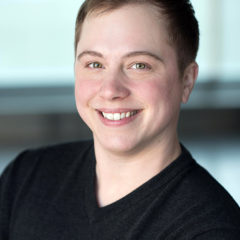
Austen Hartke. Courtesy photo
But for the past decade or so, she said, the school has “been really recognizing where we’re falling short in serving our trans students and have been actively working to rectify that.” Today Vanderbilt makes a point of sending its admissions reps to social justice conferences, where they hand out swag like pronoun buttons, to actively recruit transgender applicants.
Many seminaries, even those governed by denominations with inclusive policies, have yet to welcome transgender students fully, and systemic racial barriers to admission make seminaries less accessible to Black transgender applicants.
But even Duke Divinity School, affiliated with the United Methodist Church, which has yet to approve ordination for openly gay people, has recently added a queer theology course.
Last year, Luther Seminary invited Hartke, who has written a book on transgender Christians, to return to campus as a guest speaker in chapel. “I got to preach on the story of Jesus raising Lazarus, the idea of coming out and being unbound. And there was a really good reaction to that,” said Hartke.
